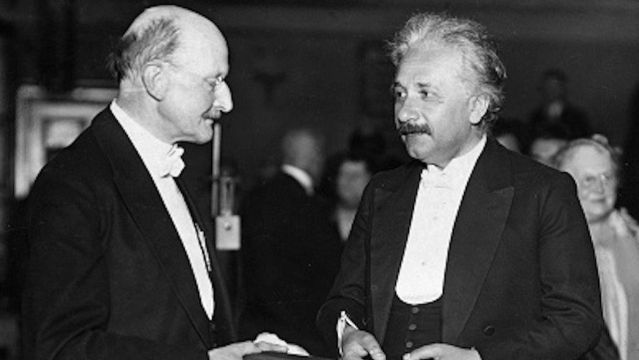Environment
The Perils of Progress
We've come a long way, but are we focused on the right things?
Posted December 18, 2023 Reviewed by Hara Estroff Marano
Key points
- Not long ago, intellectual debates attracted huge audiences.
- What is it we're moving toward when we think of our progress?
- The usual idea of progress tends not to consider emotional intelligence and empathy.
- Is there room for a new philosophy of life in the pursuit of progress?

I recently read a wonderfully engaging book, The Physicist and the Philosopher: Einstein, Bergson, and the Debate that Changed our Understanding of Time. It centered on a debate taking place in Paris in 1922, shortly after Einstein received the Nobel prize.
Einstein debated Henri Bergson, a renowned French philosopher. Bergson’s point of view about the nature of time differed markedly from Einstein’s. The contrasting worldviews dueled at a fevered pitch, attracting great numbers of an excited audience of lay people.
What Do We Mean by "Progress"?
Can you just imagine that happening today? Just over 100 years ago, intellectualism and philosophy were revered, not debased, as is the tendency now. It’s startling to note how our intellectual curiosity has retreated over this time, notwithstanding our unimaginable progress in so many other fields.
But what exactly do we mean by this term “progress”?
Progress is generally defined as forward movement. But movement towards what? The word “progress,” is naturally seen as positive. But much of the progress over the last 100 years is arguably problematic, if not cataclysmic, when we consider the unintended consequences.
As a result of the technological progress that facilitates extracting fossil fuels and modernizing our lives, we are mired in an existential crisis for survival due to global warming.
The development of nuclear weapons is an enormous technological feat, pushing militarization to a whole new level as it inches us closer to humanity’s conclusion. Progress absent mindfulness, without an expanded vista of consciousness that can see beyond its immediate goals, may be hurtling us toward extinction.
Computers and cell phones exponentially increase our knowledge base and enable warp speed communication but leave us socially fragmented and battling an epidemic of loneliness and anxiety.
Going Backward as We Move Forward
We must ask ourselves: What are the values and implications underlying our progress? Are we progressing in our humanity?
Progress should be grounded in humane awareness. "Humane" suggests compassion, empathy, love, connectivity, and a healthy correspondence with nature. This is ecological progress grounded in a participatory mindset. This is the higher level of consciousness required for human evolution and coherent progress.
You can see bifurcation in many aspects of progress. We may progress through many advances but, paradoxically, suffer as a result. Progress of this nature is divergent and extremely dangerous.
We’re probably more humane than at any time in the past. We’ve made progress in health, medicine, sanitation, living conditions, longevity, all to be applauded.
But has there been an increase in human consciousness? I think, in fact, there’s been a dumbing down.
Consider Einstein’s talk that resulted in the debate with Bergson in 1922, with thousands of people attending. It was as hot a ticket then as Taylor Swift is today. Philosophers were valued then. Intellectuals were revered.
Now pause. Can you name a single current philosopher? How about an intellectual? Do we ever see genuine intellectuals on TV? Not likely, because they wouldn’t generate income for the networks.
If everything is driven by economic gain, that’s still only one measure of progress. If it’s the only measure, we are in dire trouble.
Let’s look at how children are raised today in much of the United States. We rob them of childhood because we turn them into achievement-seekers focused on grades. Get the best grades, have the best extracurricular activities so you can get into the best college, so you can get the best job, so you can make the most money. That becomes their measure of progress.
We drive children into dysfunction as they’re compelled to achieve without a sensible balance. In the United States, in one’s lifetime, there’s a one in three possibility of suffering from a psychological or emotional disorder, often anxiety and depression. Does that sound like progress?
What’s the goal? Is it simply achievement and material progress? Well, if so, is it at the cost of the emotional and psychological health of the children, who commit suicide at breathtaking rates?
A New Objective for Living
What happened to emotional intelligence, kindness, the capacity to be caring for one another? They are cast aside in deference to academic progress for material success down the road.
We are measuring only one metric of progress, and that is damning us.
What we desperately need is a new philosophy for living, a philosophy that focuses on comprehensive and authentic progress, not just material and economic progress. This should be the debate that we’re having as a culture.
A well-balanced, integrated progress must include “Do no harm to yourself” and “Do no harm to others,” progressing toward a civil, harmonious life. A well lived life.
We have made progress on countless fronts, but in terms of consciousness, civility, intelligence, we’re falling way, way behind the mark. Progress without consciousness, progress without mindfulness, has given us the atom bomb, global warming, AI, and a host of other devastating threats to the planet and to our civilization.
So, think about progress in your own personal lives, and temper progress so that it’s not just achieving more, earning more, consuming more, but it’s also progressing toward authenticity, happiness, civility, compassion, and reverence for others and yourself.




